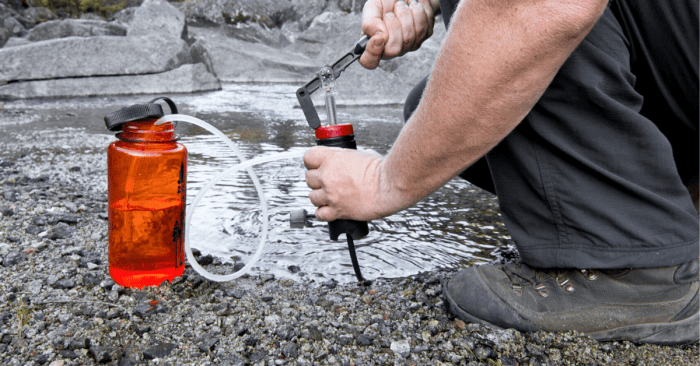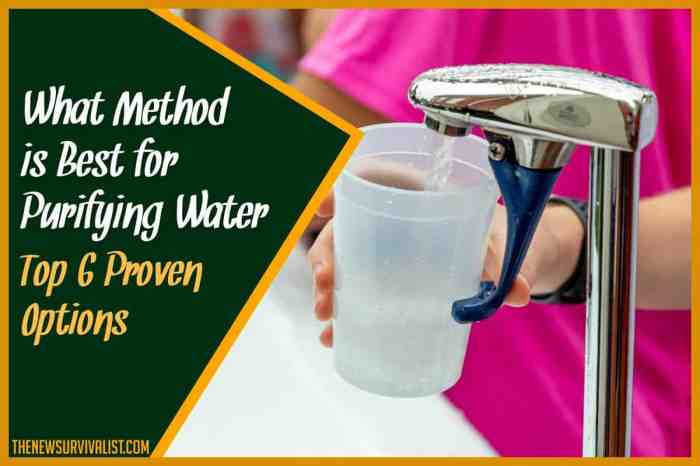Best way to purify water hunter ed – The best way to purify water for hunter education is a crucial topic for those seeking to learn the essential skills of water purification in the wilderness. This comprehensive guide will delve into various water purification methods, emergency techniques, and long-term survival strategies, empowering individuals with the knowledge to obtain clean and safe water in diverse scenarios.
Understanding the importance of water purification in hunter education, this guide will provide a detailed examination of the factors to consider when selecting a purification method, including water source, number of people, and resource availability. Additionally, it will explore emergency water purification techniques, such as solar stills and natural materials, equipping individuals with the skills to obtain clean water in challenging situations.
Methods for Water Purification

In order to obtain safe drinking water, several methods of water purification can be employed. These methods include boiling, filtration, and chemical treatment.
Boiling Method
Boiling water is a simple and effective method of water purification. Boiling water kills microorganisms, including bacteria, viruses, and parasites, by raising the water’s temperature to a point where they cannot survive. To boil water, bring it to a full rolling boil for at least one minute.
This method is particularly useful in situations where other purification methods are not available.
Filtration Process
Filtration is another effective method of water purification. Filtration involves passing water through a filter that removes particles, microorganisms, and other contaminants. Filters can be made of various materials, such as ceramic, cloth, or paper. The effectiveness of a filter depends on the size of the pores in the filter and the type of contaminants being removed.
Chemical Treatment Method
Chemical treatment is a method of water purification that uses chemicals to kill microorganisms and remove other contaminants. Chemicals commonly used for water purification include iodine and chlorine tablets. Iodine tablets are effective against bacteria and viruses, while chlorine tablets are effective against a wider range of microorganisms, including parasites.
Chemical treatment is a convenient and effective method of water purification, but it is important to follow the manufacturer’s instructions carefully to ensure that the water is safe to drink.
Factors to Consider When Choosing a Water Purification Method: Best Way To Purify Water Hunter Ed

When choosing a water purification method, several factors should be considered, including the water source, the number of people using the water, and the availability of resources.
Water Source
The water source is an important factor to consider when choosing a water purification method. Different water sources contain different types of contaminants, and some methods of purification are more effective than others at removing specific contaminants. For example, boiling water is effective at killing microorganisms, but it does not remove chemical contaminants.
Filtration is effective at removing particles and microorganisms, but it may not be effective at removing chemical contaminants. Chemical treatment is effective at removing a wide range of contaminants, but it is important to follow the manufacturer’s instructions carefully to ensure that the water is safe to drink.
Number of People Using the Water
The number of people using the water is another important factor to consider when choosing a water purification method. Some methods of purification are more efficient than others at purifying large volumes of water. For example, boiling water is a simple and effective method of purification, but it can be time-consuming to boil large volumes of water.
Filtration is a more efficient method of purifying large volumes of water, but it can be more expensive than boiling water. Chemical treatment is a convenient and effective method of purifying large volumes of water, but it is important to follow the manufacturer’s instructions carefully to ensure that the water is safe to drink.
Availability of Resources
The availability of resources is also an important factor to consider when choosing a water purification method. Some methods of purification require more resources than others. For example, boiling water requires a heat source, such as a stove or fire.
Filtration requires a filter, which can be expensive. Chemical treatment requires chemicals, which can also be expensive. It is important to consider the availability of resources when choosing a water purification method to ensure that you have the necessary resources to purify the water safely and effectively.
Emergency Water Purification Techniques
In an emergency situation, it is important to be able to purify water from any available source. There are several emergency water purification techniques that can be used, including boiling, filtration, and chemical treatment.
Effectiveness of Different Emergency Water Purification Methods
| Method | Effectiveness |
|---|---|
| Boiling | Kills microorganisms, including bacteria, viruses, and parasites |
| Filtration | Removes particles, microorganisms, and other contaminants |
| Chemical Treatment | Kills microorganisms and removes other contaminants |
Solar Still for Water Purification
A solar still is a simple and effective way to purify water in an emergency situation. To construct a solar still, you will need a clear plastic sheet, a dark-colored container, and a bowl. Place the dark-colored container in the center of the plastic sheet.
Fill the container with water. Cover the container with the plastic sheet and weigh down the edges with rocks or other heavy objects. Place the solar still in a sunny location. The sun’s heat will evaporate the water from the container, and the water vapor will condense on the plastic sheet.
The condensed water will drip into the bowl, providing you with clean drinking water.
Natural Materials for Water Purification
In an emergency situation, you can also use natural materials to purify water. Some natural materials that can be used for water purification include plants, rocks, and sand. Plants can be used to remove impurities from water. Rocks and sand can be used to filter water.
To purify water using natural materials, simply pass the water through the materials. The impurities will be removed from the water, and the water will be safe to drink.
Water Purification for Long-Term Survival
In a long-term survival situation, it is important to have a reliable source of clean drinking water. There are several methods of water purification that can be used for long-term survival, including boiling, filtration, and chemical treatment.
Essential Equipment for Water Purification
- Water filter
- Water purification tablets
- Boiling pot
- Water storage containers
Water Purification System for a Group of People, Best way to purify water hunter ed
If you are part of a group of people, it is important to have a plan for purifying water for the entire group. One way to do this is to set up a water purification system. A water purification system can be as simple or as complex as you need it to be.
The most important thing is to have a system that is capable of purifying enough water for the entire group.
Maintaining and Storing Purified Water
Once you have purified water, it is important to maintain and store it properly. To maintain purified water, keep it in a clean container and store it in a cool, dark place. To store purified water, use airtight containers. This will help to prevent the water from becoming contaminated.
FAQ
What is the most effective method for water purification in the wilderness?
Boiling water for at least one minute is the most effective method for water purification in the wilderness, as it kills all microorganisms.
How can I purify water without boiling it?
Water can be purified without boiling by using filtration systems, chemical treatment with iodine or chlorine tablets, or UV light.
What should I consider when choosing a water purification method?
When choosing a water purification method, consider the water source, number of people using the water, and availability of resources.